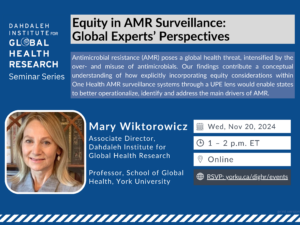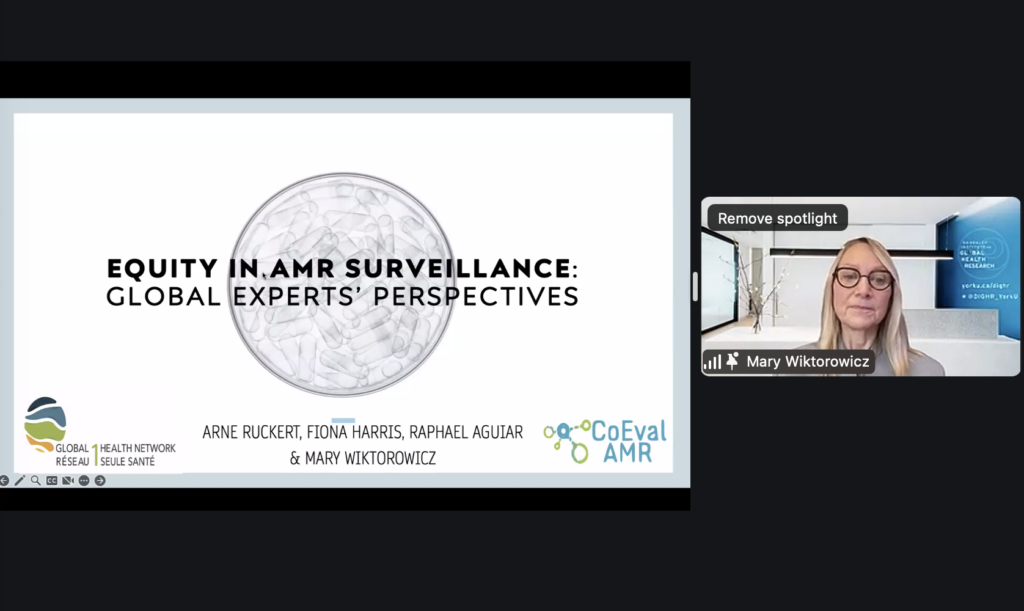Post
Published on January 3, 2025

On November 20, Dahdaleh associate director Mary Wiktorowicz delved into the topic of equity in antimicrobial resistance (AMR) surveillance, offering insights into how equity can be embedded in global surveillance systems. The discussion emphasized equity as both a distinct domain and a critical component integrated across all domains. Using a Political Ecology lens, Dr. Wiktorowicz highlighted systemic threats and global inequalities that shape health outcomes, advocating for a collective structural responsibility approach to addressing AMR.
The presentation outlined governance as a reflexive and collaborative process where stakeholders share resources and dialogue to manage complex challenges. Current research identified key entry points for equity within AMR surveillance systems, including governance and evaluation frameworks. Interviews with 17 key informants from diverse sectors revealed themes such as the conceptualization of surveillance, global redistributive dimensions, data concerns and sectoral imbalances.

Challenges to achieving equity in AMR surveillance included issues of data access, ownership, interoperability and literacy. Disparities between the Global North and South were prominent, with resource limited countries often unable to implement recommended systems due to impractical guidelines. Sectoral imbalances further compounded the problem, with human health receiving more attention and funding than sectors like agriculture and environmental health.
A conceptual model of equity in AMR surveillance was introduced, addressing factors such as geographic disparities, social determinants of health and socioeconomic inequities. The model emphasized the importance of targeting root causes, supporting equity deserving groups and fostering intersectoral collaboration. Trust building and data sharing across sectors and disciplines were identified as critical to improving equity.
The presentation concluded by calling for systemic interventions including equitable resource distribution, improved collaboration and a shift toward addressing the structural determinants of AMR. This integrated approach aims to make equity a central focus in AMR surveillance systems worldwide.
Watch the seminar presentation below: https://www.youtube.com/watch?v=9D2Cu-fZcjs
Connect with Mary Wiktorowicz.
Themes | Global Health Foresighting |
Status | Active |
Related Work |
N/A
|
Updates |
N/A
|
People |
You may also be interested in...
Join Us This September for Our Global Health Research Seminar Series
We are kicking off the 2022-23 academic year at the Dahdaleh Institute with some wonderful global health research talks this September: disaster management, humanitarian response, occupational health, and planetary health. All events will be delivered in ...Read more about this Post
New Research Show Mpox Outbreak Lead to Stigma and Blame Toward 2SLGBTQIAP+ Community
Originally published by YFile (30 May 2023) York University researchers have furthered their study of the global mpox virus by publishing a new paper on the dangerous stigmas the 2SLGBTQIAP+ community face as the outbreak continues. Since ...Read more about this Post
Global health simulation empowers tomorrow’s health leaders
Originally published by Yfile (9 April 2025). Edited by Ashley Goodfellow Craig York University’s School of Global Health is preparing the next generation of health leaders by immersing students in real-world challenges and fostering practical skills. In an era ...Read more about this Post
